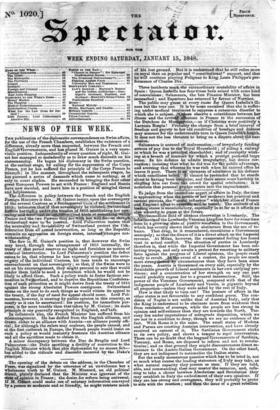NEWS OF THE WEEK.
THE publication of the diplomatic correspondence on Swiss affairs, for the use of the French Chambers, establishes the existence of a difference, already more than suspected, between the French and English Governments, and has placed M. Guizot in a very unen- viable position. Independently of every question of right, M. Gui- zot has managed so maladroitly as to draw much discredit on his statesmanship. He began his diplomacy in the Swiss question, at the earliest stage, by calling for the suppression of the Corps Francs, yet he has suffered the principle of the Corps Francs to triumph ; in like manner, throughout the subsequent stages, he has pursued a series of demands which came to nothing, as if only to court slights. He succeeded in bringing the four other great European Powers to act with France : England and Russia have now seceded, and leave him in a position of mingled threat and helplessness. The difference in policy between the French and the English Foreign Ministers is this. M. Guizot insist upon the sovereignty of the several Cantons as a fundamental b......s a the settlement in 1815; intimates that if that sovereignty be violated, Switzer/and forfeits her rigtre under the treaties of 1815 establishing her neu- trality and terrikaatiftiittleh&ar ; end hinmat something Ig'al* France and the two Powers flkt au, with her w.111 do—as thotgli I Switzerland were to be coerced. Lord Palmerston insists that the neutrality and inviolability of Switzerland protect the Coil- federation from all armed intervention, so long as the Republic commits no aggression on foreign states, internaPchanges not- withstanding. The flaw in. M. Guizot's position is, that ehowever the Swiss may break, through the arrangement of 1815 internally, the treaty of that period reserves no right and furnishes no means of external intervention. In Lord Palmerston's position the defect seems to be, that whereas he has expressly recognized the sove- reignty of the individual Cantons, his tone tends to encourage encroachment on that sovereignty ; so that, if the Swiss were to act on his encouragement, they might proceed to acts that would render them liable to need a protection which he would not be likely to afford them. Such a policy tends to foster factious ani- mosities in Switzerland, and to deprive the Republican Confedera- tion of such protection as it might derive from the treaty of 1815 against the strong Absolutist Powers contiguous. Switzerland seems on the road to do such things as would vitiate its appeal to the treaty, if the day of need for appeal should come. Lord Pal- merston, however, is steering by public opinion in this country, as nearly as it can be ascertained : his position, for immediate pur- poses, is far more tenable than that taken by M. Guizot; its main principle is one generally recognized in England, andeisafe. In collaterals also, the French Minister has suffered from his mismanagement. He has drifted from the English alliance, and drawn clolser to an alliance with Austria—an alliance purely offi- cial ; for although the rulers may coalesce, the people cannot, and at the first outbreak in Europe, the French people would insist on such a policy as would instantly frustrate the Austrian alliance and all the sacrifices made to obtain it.
A minor discrepancy between the. Duc de Broglie and Lord Palmerston—the Duke ascribing a docility of conviction to the English Minister which that able diplomatist by no means felt— has added to the ridicule and discredit incurred by the Duke's principal.


























